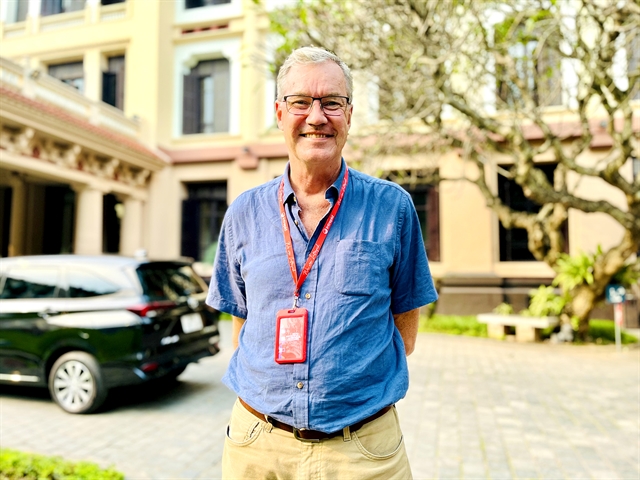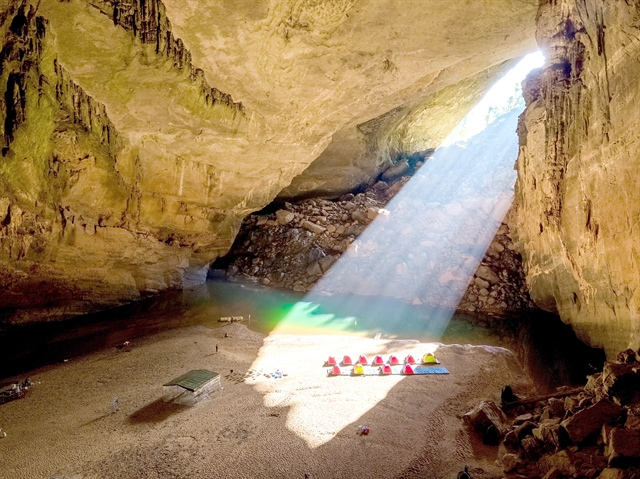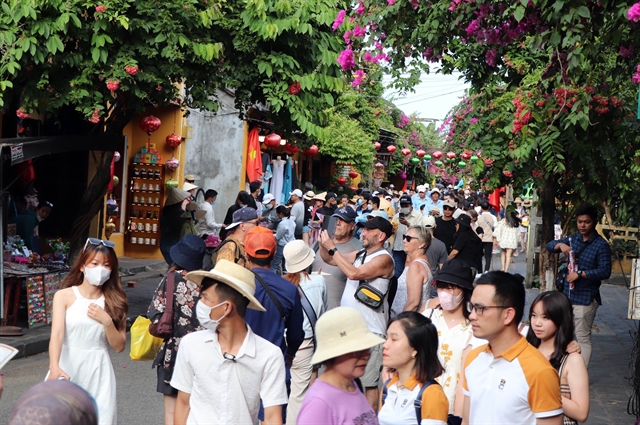.jfif) Opinion
Opinion


|
| Darrell Wade, Chair and Co-Founder of Intrepid Travel.— VNS Photo Nguyễn Hằng |
Darrell Wade, Chair and Co-Founder of Intrepid Travel, the world’s largest adventure travel company and a pioneer in responsible tourism, talked with Việt Nam News reporter Nguyễn Hằng about the potential of the Vietnamese tourism sector after the COVID-19 pandemic
How do you evaluate the potential of the Vietnamese tourism sector after the COVID-19 pandemic?
I think the first thing to say about Việt Nam tourism is to take it in historical context. Over the last 20 years, it has grown very regularly. Therefore, we see no reason for that to stop. The natural attractions within Việt Nam are diverse and really what the world is looking for. We see that in the next five, 10 or 20 years, Việt Nam tourism will continue to grow. In that long term context, to be honest, I do not think COVID-19 is relevant. We are going to forget about COVID-19 really quickly. It is just something that happened. The country will continue to grow and prosper through tourism.
The potential for Việt Nam tourism is really, I think, in the diversity of the country. You have great cities here that are attractive to foreign markets, great beaches, great adventures activities and also great touring options. It is not like some place where you just fly and you drop, that is your destination. Việt Nam has a depth of experiences right through the country, which really encourages a longer-term stay and repeat visits. We see a lot of people coming back to Việt Nam year after year because they want to experience different aspects of the same country. That is a unique characteristic of Việt Nam that not many countries have. It will really drive the long-term growth of the country.

|
| The scene inside Sơn Đoòng Cave in the coastal central province of Quảng Bình. —VNA/VNS Photo Hoàng Trung |
Compared to other countries in Southeast Asia, how do you rate Việt Nam's tourism competitiveness?
If you look at other countries that do really well in tourism, Thailand, Indonesia (Bali) and Singapore, the variety of attractions in Việt Nam is more significant. It really does offer that chance for repeat business and continued growth in the market. Plus, the value proposition of Việt Nam is still really strong. The price that a western tourist pays in Việt Nam is lower than in many of the competing countries. That is a really important function because it drives that competitive advantage. You can do more, you do more variety of things and you pay less. That is a really strong proposition.
The quality of the tourism services in Việt Nam is actually good. I think it is competitive on the global stage. I would not have said that about Việt Nam ten years ago, but today, definitely, the quality of food and beverage service, hotel service and touring is all approaching world class. At the price you are paying, it is exceptional. So, there is no problem with the quality of the tourism service in Việt Nam.
One of the best-selling features of Việt Nam is the value. Việt Nam offers incredible value to customers. You can walk down the street, eat at a really nice restaurant and pay, by international standards, a low price, but it is a world class product. It is not like you pay a little bit and you get a little bit. No, you pay a little bit and you get a lot. That is real value. I think Việt Nam should not forget the fact that value is a competitive advantage.
Việt Nam is considered a “paradise” for foreign elderly people to enjoy their retirement. What are your thoughts on that?
It is an interesting market segment. There are definitely in certain western markets, elder people who want to take longer holidays in the destination. In fact, my own brother comes to Hội An Ancient Town for a month every year. He does not go anywhere else, he just goes to Hội An. He gets a villa near the beach. He loves it with a passion because of great food, great weather, great beach, lovely people and good value. He told me: why would he go anywhere else?
That long-term stay of one month or two months is something we were not seeing ten years ago anywhere in the world. Now, it is seen as a viable holiday option each year and I think Việt Nam is very well placed for that. By the way, visas are still a sticky point in Việt Nam. From a traveller’s or a tour operator’s perspective, ease of access into the market through good air connections and favourable visa policies is a critical factor in the success of the country's long-term tourism strategy.

|
| Tourists at Hội An Ancient Town in the coastal central province of Quảng Nam. — VNA/VNS Photo Trần Tĩnh |
Could you talk about the role of tourism sustainability in a country’s competitive advantage?
First of all, I think sustainability is so critical for the future that it does not matter what market segment you are talking about. You have to get sustainability right. Whether that is premium or backpacker, it does not matter. The market is increasingly wanting to see sustainability delivered. What are you doing with plastic? What are you doing with energy? What are you doing with labour? All sorts of factors are very important in the client decision these days on where they are going to travel, how long they are going to stay, and how happy they are in that destination.
Everyone in the supply chain, hotels, transport companies and tour operators, we all have to consider sustainability and how we are going to improve that in the longer term. Because I strongly feel that sustainability now is becoming a competitive advantage between countries. Certain countries will do it really well. Certain countries will not do it well. Those countries that do it well will benefit in the long term. Their tourism industry will be really strong and prosperous for many years. Countries which do not will get less prosperous over time. In the old days, it was just a nice beach and a cheap holiday. That was enough. These days, that is not enough. You have to really build sustainability in as a part of the product.
What is the role of Việt Nam’s market for your company?
For us as a company, Việt Nam is incredibly important. We started here, operating our first trip in 1993. So we have a really long heritage in Việt Nam. Today, Intrepid operates in 120 countries around the world, but Việt Nam was country number five. We came here early.
Back in the early 90s, tourism in Việt Nam was a very small thing and very different than today. In many ways, we have grown up with the country in tourism. Việt Nam is an incredibly important destination for us. It is still our number one destination globally. And apart from the size, Việt Nam is also one of the countries with the very highest level of traveller satisfaction. We measure the Net Promoter Score (NPS) across all our destinations and Việt Nam is always in the top two or three destinations.— VNS




